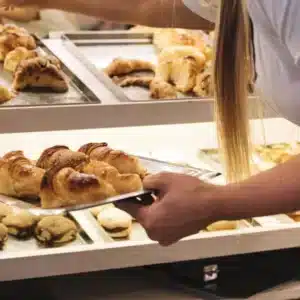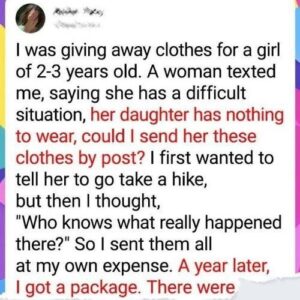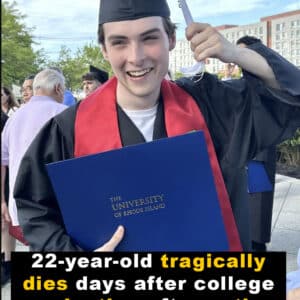I always imagined the first time I’d meet Daniel’s parents would be full of warmth—maybe awkward, sure—but the kind of awkward that ends with someone’s mom wiping a tear and saying, “You’re perfect for him.” I pictured soft light, maybe even some homemade cake, not the kind of silence that weighs on your chest and quietly splits you open.
But that’s the thing about silence. Sometimes, it says everything.
Daniel and I had been together for three years. He was the kind of man who’d bring me soup before I realized I was getting sick. Quietly thoughtful. Steady. The kind of love that slipped in gently and stayed. And even though we were engaged, there was one part of his world I hadn’t fully stepped into yet—his parents.
They lived abroad, both deaf, both sweet as pie on the few video calls we’d had. Daniel always translated, his hands moving with care as he filled the space between us with stories and smiles. I waved like a goofball. They smiled back. It was charming. But also… incomplete.
What Daniel didn’t know was that I’d been secretly learning sign language for over a year. Every night. In my office. In the bathroom mirror. While folding laundry. I wanted to meet them halfway. More than that—I wanted them to know me, not just the girl he loved, but the woman who was choosing to become part of their family.
I kept it quiet, though. I told myself I’d surprise them in person. A sweet reveal. Like a hidden talent finally shown in a moment that mattered.
So when we flew out to visit for the first time, I was nervous but excited. His childhood home was warm and candlelit, filled with the scent of stew and fresh bread. His mother, Jane, wore a cozy sweater the color of sky. His father, Henrik, beamed at me with a kindness that made me want to cry. Their hands moved fast, lovingly. Daniel stood between us like a bridge.
“She says you’re even prettier in person,” he grinned.
I smiled. I didn’t respond in sign. Not yet. I was waiting for the perfect moment.
But life rarely waits for your plans to line up.
Dinner was lovely—until it wasn’t.
Halfway through the meal, Jane signed something to Daniel, sharply. Her smile faded. I caught the meaning, even though I pretended I didn’t.
“You haven’t told her?”
Daniel’s whole body stiffened. “No. Not yet.”
I acted clueless. Asked what was going on. He smiled too quickly, lied too easily. Said something about our travel plans. But I already knew the truth was growing heavy in the room, pressing into all the spaces his love usually filled.
“She needs to know,” Jane signed again. “Before the wedding.”
And then the blow came, as simple and devastating as a candle snuffing out.
“Tell her about your daughter.”
Time stopped. My hands trembled. My stomach churned. A daughter?
I turned to him, voice low. “The daughter you never mentioned to me?”
His face turned white. His parents were stunned. My secret—my knowledge of their language—was now out in the open. I told them I’d been learning. For them. For him. I’d wanted to belong.
And suddenly, I wasn’t sure I ever had.
Daniel confessed everything. Her name was Emilia. Seven years old. The result of a relationship that had ended badly. A custody battle. A cancer diagnosis. Quiet visits. Financial support. All of it hidden away while we built a life together.
Three years. And not a word.
“I didn’t know how to tell you,” he said, kneeling beside me. “I didn’t want to lose what we had.”
“But you never gave me the chance to choose,” I whispered.
That night, I didn’t walk out. I stayed. Not because I forgave him right away—but because I needed to see the truth for myself.
The next day, we visited Emilia. Jane had baked cookies. Henrik waited in the car. I met Sofie, the mother of his child—a kind, composed woman who welcomed me with surprising ease. And Emilia? She was small, with eyes like her father’s and curls that bounced when she smiled.
“Are you Papa’s friend?” she signed shyly.
I knelt beside her. “I hope I’m more than that.”
We sat on the carpet, painting rainbows and tigers. She taught me how to dance and sign at the same time. I taught her how to say “glitter” with flair.
Daniel later told me that although Emilia could hear, sign language had become her second home. Just like her grandparents. Just like her story.
We stayed for two weeks. I visited Emilia almost every day. Read her bedtime stories. Helped her build paper crowns. Learned the sound of her laughter. It was like slipping into a life I hadn’t planned for—but one I was slowly beginning to crave.
Daniel didn’t pressure me. He just watched quietly as the pieces fell into place. He told me everything—no more secrets, no more silence. Just honesty, raw and unpolished.
And on our last night, under a canopy of white lights, Emilia curled into my lap and handed me a drawing. Three stick figures. Holding hands.
It was simple. And it wrecked me.
I hadn’t planned on this life. But sometimes the best things are the ones that find you when you least expect them. I looked at her, at him, and felt something inside me shift.
We’re home now. The wedding is back on. Emilia wants sunflowers.
“Because they always look toward the light,” she said.
And maybe that’s what we’re doing now. Turning toward the light. Toward the truth. Toward a family built not on perfection, but on choosing each other—even when it’s hard.
Especially when it’s hard.





